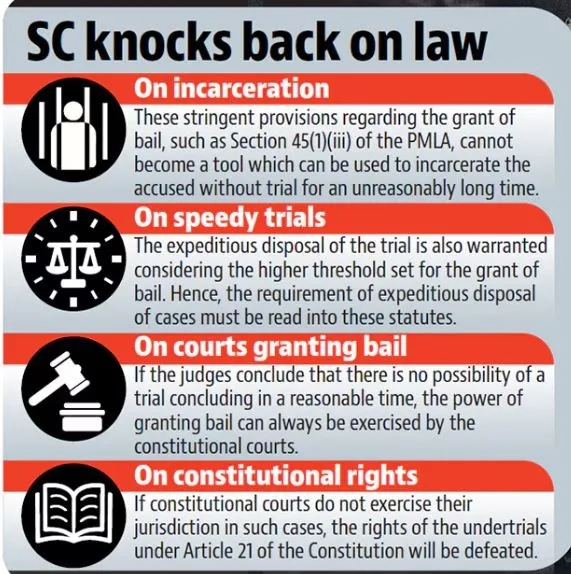Syllabus: GS2/Polity and Governance
Context
- The Supreme Court recently held that constitutional courts cannot allow provisions of the Prevention of Money Laundering Act to become instruments in the hands of the Enforcement Directorate to continue incarceration for a long time.
The Prevention of Money-Laundering Act (PMLA)
- It was enacted by Parliament of India under Article 253 of Constitution in 2002 to prevent money laundering and provide for the confiscation of property derived from or involved in money laundering.
- PMLA and the Rules notified there under came into force with effect from 2005, and it was further amended in 2009 and in 2012.
- Director, FIU-IND and Director (Enforcement) have been conferred with exclusive and concurrent powers under relevant sections of the Act to implement the provisions of the Act.
- The offence under the PMLA mainly involves money laundering obtained through criminal activities (e.g., drug trafficking, terrorism, corruption).
Bail Provisions under the Law
- Section 45 of the PMLA, which deals with bail, first states that no court can grant bail for offences under this law, and then proceeds to mention a few exceptions.
- The negative language in the provision itself shows that bail is not the rule but the exception under PMLA.
- The provision makes it mandatory to hear the public prosecutor in all bail applications, and when the prosecutor opposes bail, the court is required to apply a twin test.
- These two conditions are: (i) that there are “reasonable grounds for believing that [the accused] is not guilty of such offence”; and (ii) that “he is not likely to commit any offence while on bail”.
- There are similar provisions in several other laws that deal with serious offences — for example, Section 36AC of The Drugs and Cosmetics Act, 1940, Section 37 of The Narcotic Drugs and Psychotropic Substances Act, 1985, and Section 43D(5) of the Unlawful Activities Prevention Act, 1967.
Supreme Court’s Take on the Law

- To address concerns raised by ED regarding possible tampering with witnesses or evidence, the court imposed strict conditions on bail, including:
- regular appearance before the deputy director of ED;
- appearance before the investigating officer of the scheduled offences;
- restraint against contacting any prosecution witnesses or victims related to the scheduled offences;
- full cooperation with the trial and a refrain from asking for adjournments.
| About Directorate of Enforcement (ED) – Established: It was established in 1956 with the formation of an ‘Enforcement Unit’ under the aegis of the Department of Economic Affairs and handled Exchange Control Laws violations under Foreign Exchange Regulation Act, 1947 (FERA 1947). 1. A year later, the Enforcement Unit was renamed the Enforcement Directorate. – It is a multi-disciplinary organization mandated with investigation of the offence of money laundering and violations of foreign exchange laws. The statutory functions of the Directorate include enforcement of following Acts: – The Prevention of Money Laundering Act, 2002 (PMLA): It is a criminal law enacted to prevent money, ED has been given the responsibility to enforce the provisions of the PMLA. 1. It does so by conducting investigations to trace the assets derived from proceeds of crime, to provisionally attach the property and to ensure prosecution of the offenders and confiscation of the property by the Special court. – The Foreign Exchange Management Act, 1999 (FEMA): It is a civil law enacted to consolidate and amend the laws relating to facilitate external trade and payments. 1. ED has been given the responsibility to conduct investigation into suspected contraventions of foreign exchange laws and regulations, to adjudicate and impose penalties on those adjudged to have contravened the law. – The Fugitive Economic Offenders Act, 2018 (FEOA): This law was enacted to deter economic offenders from evading the process of Indian law by remaining outside the jurisdiction of Indian courts. 1. It is a law whereby the Directorate is mandated to attach the properties of the fugitive economic offenders who have escaped from India warranting arrest and provide for the confiscation of their properties to the Central Government. |
Conclusion
- While the PMLA provisions have faced scrutiny, the Supreme Court has consistently upheld their validity, emphasising the need to combat money laundering effectively.
- The balance between law enforcement powers and individual rights remains a critical aspect of this legal framework.
Source: TH
Previous article
Overseas Citizen of India (OCI)
Next article
Business Reforms Action Plan (BRAP) 2024